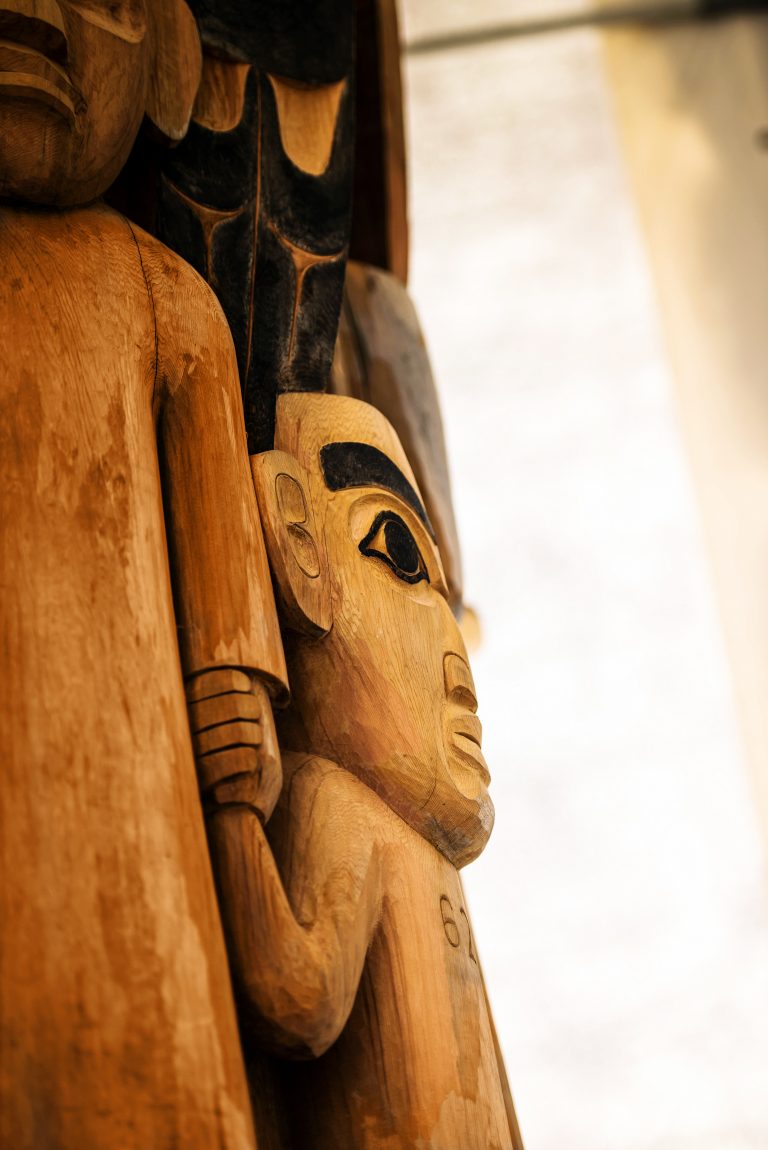Honouring a Time Before, During and After Canada’s Indian Residential Schools
Reconciliation Pole was installed in a traditional Haida manner on Saturday, April 1, 2017 on Main Mall, between Agronomy Road and Thunderbird Boulevard on UBC’s Point Grey Campus, which is located on the traditional, ancestral and unceded territory of the Musqueam First Nation.
Download the formal invitation (PDF).
Download the event program (PDF).
Watch a recording of the speeches at the event.
Last updated: April 7, 2017
Background
The University of British Columbia has partnered with a private donor to commission the carving of a 55-foot pole by 7idansuu (Edenshaw), James Hart, Haida master carver and Hereditary Chief.
The Reconciliation Pole is one of two UBC initiatives that aim to capture the long trajectory of Indigenous and Canadian relations and to ensure that one part of that, the history of Canada’s Indian residential schools, will never be forgotten.
The other initiative is the construction of the Indian Residential School History and Dialogue Centre, located between the Koerner Library and the Irving K. Barber Learning Centre. The Indian Residential School History and Dialogue Centre will provide former students and their families with access to the records of the Truth and Reconciliation Commission of Canada and give students and visitors ways to understand the history and lasting effects of Indian residential schools as a context for thinking about contemporary relationships.
Both the pole and the centre will be located on the Vancouver campus on the traditional, ancestral and unceded territories of the Musqueam people.
UBC has a long-standing commitment to Aboriginal engagement, with programs and initiatives across campus addressing issues of concern to Indigenous students, scholars and communities as well as developing the capacity of all students to better understand Indigenous history, perspectives and issues. UBC has Canada’s oldest aboriginal law program, an Indigenous teacher education program, an aboriginal residency program for medical students, the First Nations and Endangered Languages program, the First Nations and Indigenous Studies program and many other programs and concentrations.
About the artist
Born in 1952 into the Eagle Clan at Old Massett, Haida Gwaii, Haida master carver and Hereditary Chief 7idansuu, James Hart, has been carving since 1979. In addition to his monumental sculptures and totem poles, he is a skilled jeweller and printmaker and is considered a leader among Haida artists in the use of bronze casting.
Learn more on the Morris and Helen Belkin Gallery website.

Transportation
To avoid delay in arriving, please allow an extra 30 minutes to park and walk to the event. Agronomy Road from Engineering Road to Thunderbird Crescent will be a Pedestrian Only Zone.
Public transportation
Please visit Translink for route information and schedules.
Parking
Please use Thunderbird Parkade at 6085 Thunderbird Boulevard for parking for the event at a special day rate of $5.00. There is no available street parking near the event area. All vehicles parked on adjacent streets will be towed at their expense.
Accesible parking
Suggested parking for wheelchair accessibility is the C2 lot (Agronomy Road and Health Sciences Mall – next to the TEF3 building). An accessible drop off area is available close to the event location at Agronomy Road and Engineering Road.
Charter or private bus transportation
Special event bus drop off and parking information is available to download here.
Food
The Hungry Nomad Food Truck
11:00 am – 3:30 pm
In front of the H.R. Macmillan Building, 2357 Main Mall
Tim Hortons
11:00 am – 5:00 pm
Forest Sciences Centre, 2424 Main Mall
Starbucks
6:30 am – 10:00 pm
6190 Agronomy Road
Bean Around the World
8:00 am – 6:00 pm
Old Barn Community Centre, 6308 Thunderbird Boulevard
See hours for other UBC Food Services locations.